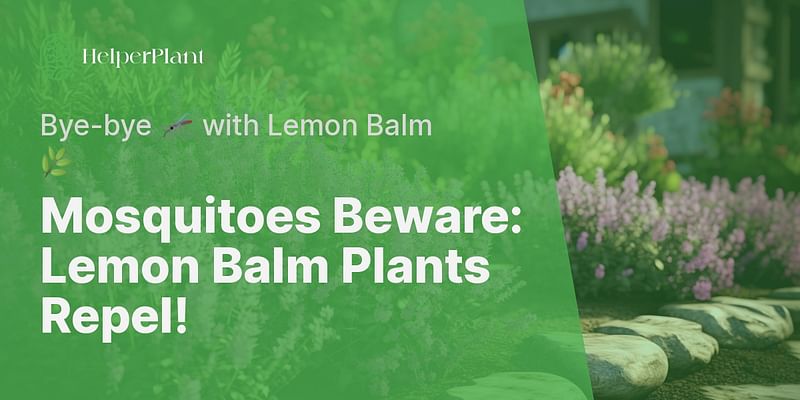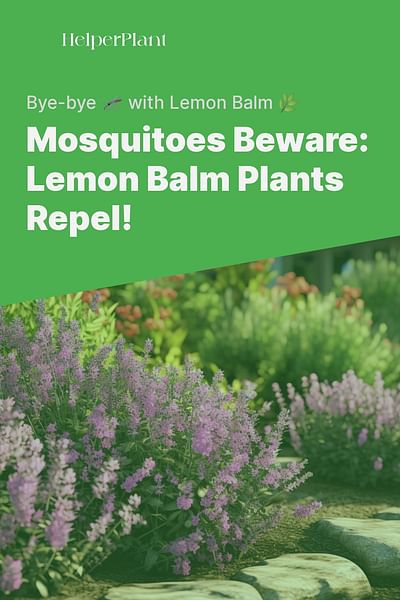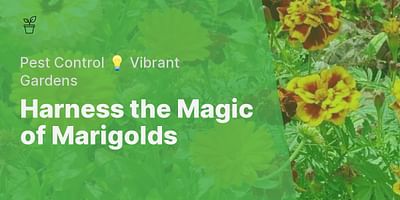Maxwell is a botanist and researcher who specializes in plant interactions. He has published numerous papers on the subject and is always looking for new ways to improve plant growth. In his free time, he enjoys playing chess and reading science fiction.
Yes, lemon balm plants can indeed be used to repel mosquitoes from your garden! Lemon balm, also known as Melissa officinalis, is a fragrant herb that not only adds beauty to your garden but also acts as a natural mosquito repellent. Its strong lemony scent is highly effective in keeping mosquitoes at bay.
Mosquitoes are not only annoying but can also transmit diseases such as malaria, dengue fever, and Zika virus. Using lemon balm as a natural mosquito repellent is a safe and eco-friendly alternative to chemical-based repellents.
To make the most of lemon balm's mosquito-repelling properties, consider the following tips for companion planting and garden design:
1. Plant lemon balm near outdoor seating areas: Lemon balm can be grown in pots or directly in the ground. By placing it near your outdoor seating areas, you can create a natural barrier against mosquitoes. The lemony scent will help mask the attractants that draw mosquitoes in, making it less likely for them to bother you and your guests.
2. Combine lemon balm with other mosquito-repelling plants: Lemon balm works even better when combined with other mosquito-repelling plants. Consider planting it alongside citronella grass, lavender, basil, rosemary, or marigolds. These plants not only enhance the mosquito-repelling effect but also add beauty and variety to your garden.
Mosquito-Repelling Companion Plants for Lemon Balm
| Plant Name | Mosquito Repellent | Complements Lemon Balm | Additional Benefits |
|---|---|---|---|
| Citronella Grass | Yes ✅ | Yes ✅ | Adds height and texture to the garden |
| Lavender | Yes ✅ | Yes ✅ | Attracts pollinators, has calming scent |
| Basil | Yes ✅ | Yes ✅ | Edible, attracts pollinators |
| Rosemary | Yes ✅ | Yes ✅ | Edible, drought-resistant |
| Marigolds | Yes ✅ | Yes ✅ | Adds color, deters other pests |
3. Crush the leaves: To release the maximum amount of scent, gently crush the leaves of the lemon balm plant. This will help to disperse the lemony fragrance and increase its effectiveness in repelling mosquitoes.
4. Harvest and dry the leaves: Lemon balm leaves can be harvested and dried to create homemade mosquito repellent sachets. Simply gather a handful of leaves, tie them together with a string, and hang them in areas where mosquitoes are a problem. The dried leaves will continue to release their scent and keep mosquitoes away.
5. Consider your garden's location: Lemon balm is a versatile plant that can thrive in various climates. However, it particularly thrives in warm and sunny locations. If you live in a region with a mild climate, such as Florida, lemon balm can be an excellent addition to your garden for repelling mosquitoes.
Remember, while lemon balm is effective in repelling mosquitoes, it may not completely eliminate them. It's always a good idea to use additional mosquito control measures, such as removing standing water, using screens on windows and doors, and wearing protective clothing.
In conclusion, lemon balm plants are a fantastic addition to any garden looking to repel mosquitoes naturally. By planting lemon balm near seating areas, combining it with other mosquito-repelling plants, and utilizing its leaves in sachets, you can create a more enjoyable outdoor space while keeping those pesky mosquitoes at bay.














